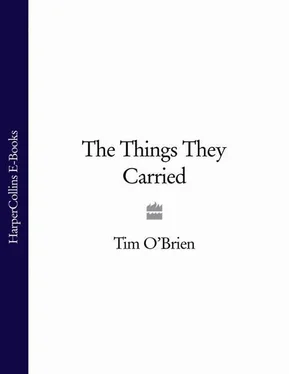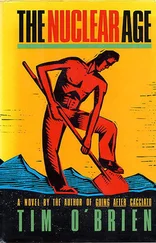Tim O’Brien - The Things They Carried
Здесь есть возможность читать онлайн «Tim O’Brien - The Things They Carried» — ознакомительный отрывок электронной книги совершенно бесплатно, а после прочтения отрывка купить полную версию. В некоторых случаях можно слушать аудио, скачать через торрент в формате fb2 и присутствует краткое содержание. Жанр: unrecognised, на английском языке. Описание произведения, (предисловие) а так же отзывы посетителей доступны на портале библиотеки ЛибКат.
- Название:The Things They Carried
- Автор:
- Жанр:
- Год:неизвестен
- ISBN:нет данных
- Рейтинг книги:4 / 5. Голосов: 1
-
Избранное:Добавить в избранное
- Отзывы:
-
Ваша оценка:
- 80
- 1
- 2
- 3
- 4
- 5
The Things They Carried: краткое содержание, описание и аннотация
Предлагаем к чтению аннотацию, описание, краткое содержание или предисловие (зависит от того, что написал сам автор книги «The Things They Carried»). Если вы не нашли необходимую информацию о книге — напишите в комментариях, мы постараемся отыскать её.
The Things They Carried — читать онлайн ознакомительный отрывок
Ниже представлен текст книги, разбитый по страницам. Система сохранения места последней прочитанной страницы, позволяет с удобством читать онлайн бесплатно книгу «The Things They Carried», без необходимости каждый раз заново искать на чём Вы остановились. Поставьте закладку, и сможете в любой момент перейти на страницу, на которой закончили чтение.
Интервал:
Закладка:
They were called legs or grunts.
To carry something was to hump it, as when Lieutenant Jimmy Cross humped his love for Martha up the hills and through the swamps. In its intransitive form, to hump meant to walk, or to march, but it implied burdens far beyond the intransitive.
Almost everyone humped photographs. In his wallet, Lieutenant Cross carried two photographs of Martha. The first was a Kodacolor snapshot signed Love, though he knew better. She stood against a brick wall. Her eyes were gray and neutral, her lips slightly open as she stared straight-on at the camera. At night, sometimes, Lieutenant Cross wondered who had taken the picture, because he knew she had boyfriends, because he loved her so much, and because he could see the shadow of the picture-taker spreading out against the brick wall. The second photograph had been clipped from the 1968 Mount Sebastian yearbook. It was an action shot – women’s volleyball–and Martha was bent horizontal to the floor, reaching, the palms of her hands in sharp focus, the tongue taut, the expression frank and competitive. There was no visible sweat. She wore white gym shorts. Her legs, he thought, were almost certainly the legs of a virgin, dry and without hair, the left knee cocked and carrying her entire weight, which was just over one hundred pounds. Lieutenant Cross remembered touching that left knee. A dark theater, he remembered, and the movie was Bonnie and Clyde, and Martha wore a tweed skirt, and during the final scene, when he touched her knee, she turned and looked at him in a sad, sober way that made him pull his hand back, but he would always remember the feel of the tweed skirt and the knee beneath it and the sound of the gunfire that killed Bonnie and Clyde, how embarrassing it was, how slow and oppressive. He remembered kissing her good night at the dorm door. Right then, he thought, he should’ve done something brave. He should’ve carried her up the stairs to her room and tied her to the bed and touched that left knee all night long. He should’ve risked it. Whenever he looked at the photographs, he thought of new things he should’ve done.
What they carried was partly a function of rank, partly of field specialty.
As a first lieutenant and platoon leader, Jimmy Cross carried a compass, maps, code books, binoculars, and a .45-caliber pistol that weighed 2.9 pounds fully loaded. He carried a strobe light and the responsibility for the lives of his men.
As an RTO, Mitchell Sanders carried the PRC-25 radio, a killer, 26 pounds with its battery.
As a medic, Rat Kiley carried a canvas satchel filled with morphine and plasma and malaria tablets and surgical tape and comic books and all the things a medic must carry, including M&Ms for especially bad wounds, for a total weight of nearly 20 pounds.
As a big man, therefore a machine gunner, Henry Dobbins carried the M-60, which weighed 23 pounds unloaded, but which was almost always loaded. In addition, Dobbins carried between 10 and 15 pounds of ammunition draped in belts across his chest and shoulders.
As PFCs or Spec 4s, most of them were common grunts and carried the standard M-16 gas-operated assault rifle. The weapon weighed 7.5 pounds unloaded, 8.2 pounds with its full 20-round magazine. Depending on numerous factors, such as topography and psychology, the riflemen carried anywhere from 12 to 20 magazines, usually in cloth bandoliers, adding on another 8.4 pounds at minimum, 14 pounds at maximum. When it was available, they also carried M-16 maintenance gear – rods and steel brushes and swabs and tubes of LSA oil – all of which weighed about a pound. Among the grunts, some carried the M-79 grenade launcher, 5.9 pounds unloaded, a reasonably light weapon except for the ammunition, which was heavy. A single round weighed 10 ounces. The typical load was 25 rounds. But Ted Lavender, who was scared, carried 34 rounds when he was shot and killed outside Than Khe, and he went down under an exceptional burden, more than 20 pounds of ammunition, plus the flak jacket and helmet and rations and water and toilet paper and tranquilizers and all the rest, plus the unweighed fear. He was dead weight. There was no twitching or flopping. Kiowa, who saw it happen, said it was like watching a rock fall, or a big sandbag or something – just boom, then down – not like the movies where the dead guy rolls around and does fancy spins and goes ass over teakettle – not like that, Kiowa said, the poor bastard just flat-fuck fell. Boom. Down. Nothing else. It was a bright morning in mid-April. Lieutenant Cross felt the pain. He blamed himself. They stripped off Lavender’s canteens and ammo, all the heavy things, and Rat Kiley said the obvious, the guy’s dead, and Mitchell Sanders used his radio to report one US KIA and to request a chopper. Then they wrapped Lavender in his poncho. They carried him out to a dry paddy, established security, and sat smoking the dead man’s dope until the chopper came. Lieutenant Cross kept to himself. He pictured Martha’s smooth young face, thinking he loved her more than anything, more than his men, and now Ted Lavender was dead because he loved her so much and could not stop thinking about her. When the dustoff arrived, they carried Lavender aboard. Afterward they burned Than Khe. They marched until dusk, then dug their holes, and that night Kiowa kept explaining how you had to be there, how fast it was, how the poor guy just dropped like so much concrete. Boom-down, he said. Like cement.
In addition to the three standard weapons – the M-60, M-16, and M-79 – they carried whatever presented itself, or whatever seemed appropriate as a means of killing or staying alive. They carried catch-as-catch-can. At various times, in various situations, they carried M-14s and CAR-15s and Swedish Ks and grease guns and captured AK-47s and Chi-Coms and RPGs and Simonov carbines and black-market Uzis and .38-caliber Smith & Wesson handguns and 66 mm LAWs and shotguns and silencers and blackjacks and bayonets and C-4 plastic explosives. Lee Strunk carried a slingshot; a weapon of last resort, he called it. Mitchell Sanders carried brass knuckles. Kiowa carried his grandfather’s feathered hatchet. Every third or fourth man carried a Claymore antipersonnel mine – 3.5 pounds with its firing device. They all carried fragmentation grenades – 14 ounces each. They all carried at least one M-18 colored smoke grenade – 24 ounces. Some carried CS or tear-gas grenades. Some carried white phosphorus grenades. They carried all they could bear, and then some, including a silent awe for the terrible power of the things they carried.
In the first week of April, before Lavender died, Lieutenant Jimmy Cross received a good-luck charm from Martha. It was a simple pebble, an ounce at most. Smooth to the touch, it was a milky white color with flecks of orange and violet, oval shaped, like a miniature egg. In the accompanying letter, Martha wrote that she had found the pebble on the Jersey shoreline, precisely where the land touched water at high tide, where things came together but also separated. It was this separate-but-together quality, she wrote, that had inspired her to pick up the pebble and to carry it in her breast pocket for several days, where it seemed weightless, and then to send it through the mail, by air, as a token of her truest feelings for him. Lieutenant Cross found this romantic. But he wondered what her truest feelings were, exactly, and what she meant by separate-but-together. He wondered how the tides and waves had come into play on that afternoon along the Jersey shoreline when Martha saw the pebble and bent down to rescue it from geology. He imagined bare feet. Martha was a poet, with the poet’s sensibilities, and her feet would be brown and bare, the toenails unpainted, the eyes chilly and somber like the ocean in March, and though it was painful, he wondered who had been with her that afternoon. He imagined a pair of shadows moving along the strip of sand where things came together but also separated. It was phantom jealousy, he knew, but he couldn’t help himself. He loved her so much. On the march, through the hot days of early April, he carried the pebble in his mouth, turning it with his tongue, tasting sea salt and moisture. His mind wandered. He had difficulty keeping his attention on the war. On occasion he would yell at his men to spread out the column, to keep their eyes open, but then he would slip away into daydreams, just pretending, walking barefoot along the Jersey shore, with Martha, carrying nothing. He would feel himself rising. Sun and waves and gentle winds, all love and lightness.
Читать дальшеИнтервал:
Закладка:
Похожие книги на «The Things They Carried»
Представляем Вашему вниманию похожие книги на «The Things They Carried» списком для выбора. Мы отобрали схожую по названию и смыслу литературу в надежде предоставить читателям больше вариантов отыскать новые, интересные, ещё непрочитанные произведения.
Обсуждение, отзывы о книге «The Things They Carried» и просто собственные мнения читателей. Оставьте ваши комментарии, напишите, что Вы думаете о произведении, его смысле или главных героях. Укажите что конкретно понравилось, а что нет, и почему Вы так считаете.












